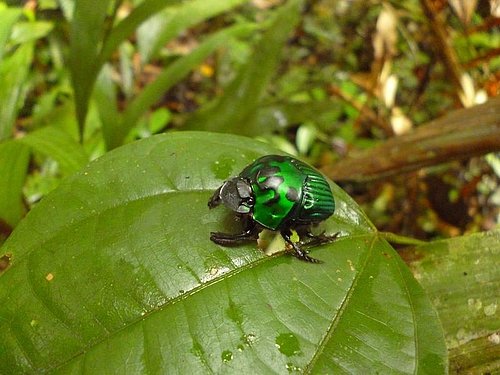- Share this article
- Subscribe to our newsletter
Limited value of tree plantations for biodiversity conservation
In light of declining natural forests, tree plantations may seem to be a good way to replace forest habitats. But what are the possible benefits of these plantations for biological diversity? A team of researchers led by the German Centre for Integrative Biodiversity Research (iDiv), Friedrich Schiller University Jena (FSU) and Martin Luther University Halle-Wittenberg (MLU), investigated this question using the example of beetles. The study is now published in Forest Ecology and Management.
Beetles account for 27 per cent of all insect species world-wide and are often used as indicators for the effects of climate change and habitat fragmentation on biodiversity. In forests, they serve important functions – for example, they contribute to the decomposition of plant and animal biomass, making the nutrients stored inside of this biomass available to plants.
Tree plantations host significantly fewer beetle species
For their research, the scientists analysed 83 published studies on beetle diversity in tree plantations and old-growth forests. “Of course, the benefit of plantations always depends on the planted tree species,” says Dr Silvia Gallegos from MLU, one of the lead authors of the paper. “Mixed cultures are better than monocultures, and native species are better than exotic species,” she adds.
In general, the global analysis showed significant differences in the beetle diversity of plantations and forests. On average, tree plantations were home to one third fewer species than old-growth forests and hosted about half as many individuals.
Furthermore, the researchers found major differences in the composition of beetle communities in plantations and forests. Even tree plantations with a similar number of beetle species and individuals to that of old-growth forests still displayed a significant difference in species composition. Beetle species which feed on dead organic substances were particularly affected, which might be due to less diverse food resources offered by plantations.
Species feeding on other insects were also less common. “This indicates that plantations are home to fewer predators. Old-growth forests might thus be more resistant to herbivores and pests than artificial tree plantations,” says co-author Dr Stephan Kambach from MLU and iDiv.
Plantations cannot replace pristine forests
The most significant differences in the composition of beetle communities were found in tropical and subtropical regions. In these regions, differences in the number of species and individuals between plantations and forests were also largest. Thus, tree plantations cannot serve as a replacement for tropical primary forests, the study found.
With their study, the researchers show that tree plantations, in particular when planted in mixed cultures – might provide an important tool to minimise habitat loss of forest-adapted species. “However, tree plantations can neither sustain the diversity nor the composition of beetle communities of old-growth forests, limiting their value for forest conservation,” said co-author Georg Albert from iDiv and FSU.
(iDiv/wi)
Original publication:
Georg Albert, Silvia C. Gallegos, Keri Alexandra Greig, Mario Hanisch, Daniela Limache de la Fuente, Stephanie Föst, Stephanie D. Maier, Chaya Sarathchandra, Helen R. P. Phillips, Stephan Kambach: “The conservation value of forests and tree plantations for beetle (Coleoptera) communities: A global meta-analysis”; Forest Ecology and Management, 2021 DOI: 10.1016/j.foreco.2021.119201





Add a comment
Be the First to Comment